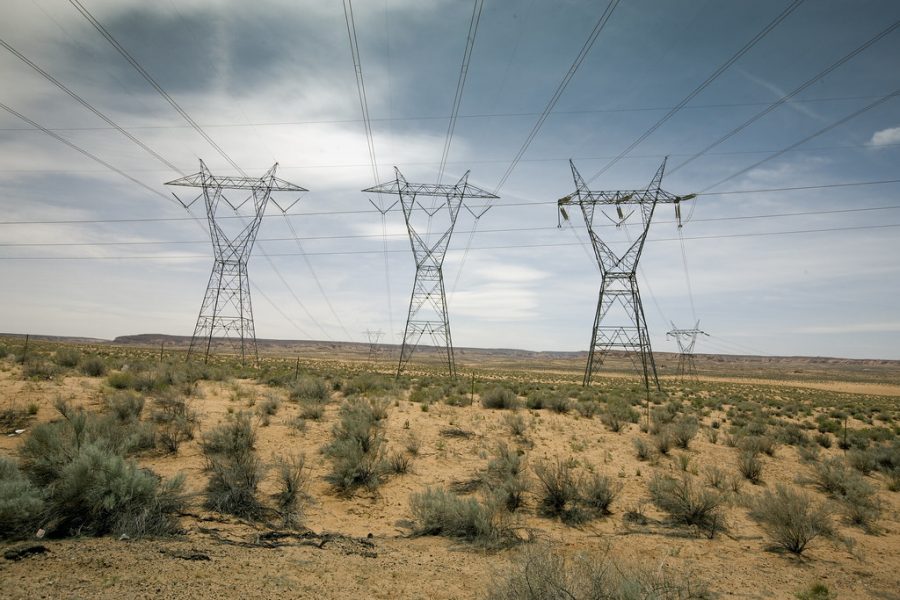Review of Gretchen Bakke’s “The Grid”
Why America is Unprepared for Power Outages
Photo Courtesy of Carol M. Highsmith on Creative Commons
Gretchen Bakke’s “The Grid” explores the flaws of America’s modern energy grid, one of the largest machines in the world.
March 30, 2021
Earlier this year, Texans experienced a power outage that lasted for a week. It was a major event not only because of the dangerous weather conditions and lack of utilities but also because it exposed a critical flaw that existed within the Electric Reliability Council of Texas’ management of the power grid: in the case of a storm, the council was completely unprepared to handle it.
However, what if I told you that similar inefficiencies which snowballed into last month’s disaster in our grid are present nationwide? That is the driving force behind this review of Gretchen Bakke’s book, “The Grid,” which exposes the unreliable nature of one of the world’s largest machines and how practices such as massive deregulation and antiquated designs led to America having the most electrical outages out of any developed nation.
The main draw of “The Grid” is the history that it is unafraid to dive into, explaining each and every one of our grid’s shortcomings. America used to rely on microgrids, powered by one or two generation plants and creating what Bakke describes as a “black spaghetti tangle of wires.” Out of dissatisfaction with this system, a new one was adopted that supplied large-scale energy to citizens, first in the city of Buffalo, NY and then becoming the standard form of electricity infrastructure.
However, one drawback of this system is that while microgrids were hard to consolidate under the power of a monopoly, Americans were convinced that a large-scale grid would benefit under the wing of an uncontested corporate entity. Soon enough, this is what happened: by the 1920s, 75% of American electricity was controlled by 10 firms.
At the expense of smaller businesses, this model thrived for years. But, although companies did have monopolistic control, there was a general agreement that each should control one another. That was until the 1970s, when an embargo from the Organization of the Petroleum Exporting Countries, or OPEC, caused fuel prices to soar and corporations to take more and more control of the market.
Electricity was a commodity to be bought and sold. For this reason, the transportation and measurement of electricity became more important – if you made more power lines over a larger distance, you controlled a bigger share of the market. But these power lines, insufficient at carrying too much power over a long distance, overheated, sagged and eventually shorted out. This is a great section of the book that explains how excessive economic liberalization caused the priorities of electricity companies to shift.
Bakke also takes care to connect many modern disasters to the way our energy system works, like the return of microgrids in the mid-Atlantic region amid 2012’s Hurricane Sandy. While microgrids operating across an entire country can be inefficient, many Americans are familiar with the sad reality that the nationwide grid is prone to failure.
Many current microgrids are also powered by renewable energy, which our grid is unprepared to handle as well. Despite the fact that, according to the book, 53.3% of newly installed generators in 2014 were wind or solar, the time and climate-specific nature of them means that our nation, which constantly consumes electricity, did not build adequate storage facilities.
With discussing the issues also comes providing solutions, and here Bakke’s research concludes with a bit of optimism. Some solutions are already being implemented, such as the addition of “smart meters” that track consumption by peak demand hours so that none of it is wasted, or that it can be directed towards areas with power outages more efficiently. But above all else, what America needs to do is improve how it stores electricity. Bakke cites a battery in Fairbanks, AK that supplies 40 megawatts of power for seven minutes. They can be used anywhere, although they are held back by their current capabilities.
Many Americans are prepared because they already know that the system could fail at any moment, leaving them without power. Many Texans endured through the outages with backup generators, a similar kind of resourcefulness used in New York and New Jersey’s 2012 Hurricane Sandy microgrids. “The Grid” is an excellent explanation of why Americans feel this way about one of the largest machines in the world, and if you want a deeper understanding of Texas’ energy issues, read this book.










![Broadcast, yearbook and newspaper combined for 66 Interscholastic League Press Conference awards this year. Yearbook won 43, newspaper won 14 and broadcast took home nine. “I think [the ILPC awards] are a great way to give the kids some acknowledgement for all of their hard work,” newspaper and yearbook adviser Paige Hert said. “They typically spend the year covering everyone else’s big moments, so it’s really cool for them to be celebrated so many times and in so many different ways.”](https://cphswolfpack.com/wp-content/uploads/2025/05/edited-ILPC.jpg)





![Looking down at his racket, junior Hasun Nguyen hits the green tennis ball. Hasun has played tennis since he was 9 years old, and he is on the varsity team. "I feel like it’s not really appreciated in America as much, but [tennis] is a really competitive and mentally challenging sport,” Nguyen said. “I’m really level-headed and can keep my cool during a match, and that helps me play a bit better under pressure.” Photo by Kyra Cox](https://cphswolfpack.com/wp-content/uploads/2025/09/hasun.jpg)

![Bringing her arm over her head and taking a quick breath, junior Lauren Lucas swims the final laps of the 500 freestyle at the regionals swimming competition on date. Lucas broke the school’s 18-year-old record for the 500 freestyle at regionals and again at state with a time of 4:58.63. “I’d had my eye on that 500 record since my freshman year, so I was really excited to see if I could get it at regionals or districts,” Lucas said. “ State is always a really fun experience and medaling for the first time was really great. It was a very very tight race, [so] I was a bit surprised [that I medaled]. [There were] a lot of fast girls at the meet in general, [and] it was like a dogfight back and forth, back and forth.” Photo by Kaydence Wilkinson](https://cphswolfpack.com/wp-content/uploads/2025/03/Kaydence-2.7-23-edit-2.jpg)
![As her hair blows in the wind, senior Brianna Grandow runs the varsity girls 5K at the cross country district meet last Thursday. Grandow finished fourth in the event and led the varsity girls to regionals with a third place placement as a team. “I’m very excited [to go to regionals],” Grandow said. “I’m excited to race in Corpus Christi, and we get to go to the beach, so that’s really awesome.” Photo by Addison Bruce](https://cphswolfpack.com/wp-content/uploads/2025/10/brianna.jpg)






























